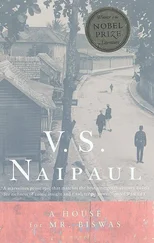We all lived easily with this kind of cruelty. We saw it, but we seldom thought about it. Eventually these people from India died out; by the late 1940s they would nearly all have died. In the early 1940s my father talked to some of them and wrote an article about them for a local Indian magazine. When I went to work in the Red House they were no longer there in Woodford Square. What I remember were the black madmen, two or three of them, one of them with tangled long plaits or tails of stiff hair, grey-brown with dirt and dust and oil, and wearing a Robinson Crusoe-like set of clothes, an accumulation or improvisation not of skins but of rags that had all lost their original colour and turned black and greasy. Perhaps he was harmless; but he had the madman’s assurance, and people walking through the square kept away from where he was, and tried to avoid his bright, inward-seeing eyes.
This was where I went to work every day, in the Registrar-General’s Department, between St. Vincent Street and Woodford Square.
MY JOB as an acting second-class clerk was to make copies of birth, marriage and death certificates. People who needed these certificates came to the Red House and made an arrangement with one of the freelance searchers who hung about the entrance to the department, near the notice-boards, waiting for customers. These searchers, after they had been given possible dates by their customers, then used stamped forms to requisition various volumes of certificates; the department’s messengers brought out the thick, heavy bound volumes, more wide than high, from the vaults; the searchers sat in the outer office on a polished long brown desk and searched through the volumes. In this room — with a view through the tall windows of the lawns of the Red House and the trees and iron rails of Woodford Square — there was an unexpected atmosphere of the classroom, with grown and sometimes elderly black men sitting side by side at the long desk, sometimes for a whole morning, as if under an enchantment laid on them at school, and turning the very wide pages of very big books, one page at a time. In a separate area of the outer office lawyers’ clerks looked for deeds. These men sat at single desks and some of them wore ties. They were altogether a higher class than the birth-and-death certificate-searchers, who really were in business — making a small, insecure living — because they could read and write, and many of the people who wanted certificates couldn’t.
When a searcher found what he was looking for, he made a request for a copy; and a messenger brought the request and the appropriate volume to my table. A table, rather than a desk: I was only an acting second-class clerk, a stop-gap, and I sat at a narrow table near the vault, and did my work facing the green-distempered wall. The messengers passed behind me all the time on their way to and from the vault. The volumes I had to copy from were placed in a pile on my right; when I was finished with them I put them in a pile on my left. The piles were high: each volume was three or four inches thick, and about fifteen inches wide.
The volumes smelled of fish glue. This was what they were bound with; and I suppose the glue was made from a boiling down of fish bones and skin and offal. It was the colour of honey; it dried very hard, and every careless golden drip had the clarity of glass; but it never lost the smell of fish and rottenness.
I had been told that everything printed in the island was lodged in the vault. All the records of the colony were there, all the births, deaths, deeds, transfers of property and slaves, all the life of the island for the century and a half of the colonial time. I would have liked to look at old things, old newspapers, old books. But the smell offish glue was very strong in the vault. That, together with the smell of old dust and old paper, the airlessness, which became worse the deeper you went in, the dim light, and the sheer quantity of old paper, was too much for me.
Morning and afternoon the copies I had written out were checked and initialled by a senior clerk, who came and sat at my table, like a teacher in the kindergarten. Then they were taken for signature to the desk of the big man of our office: the deputy registrar-general or sometimes the acting deputy registrar-general, in whose full name I had had to write out the copies. Then stamps were stuck on, cancelled with the raised letters of the iron seal of the department; and the copies were at last ready to be handed out.
All of this searching, writing, checking, signing, the attentions of so many people — for a job that might nowadays be done by one person and a computer. All of that fetching and carrying by the messengers: they were on their feet for much of the day, tramping between the vault and the outer office, cradling those bulky, awkwardly shaped volumes in their arms. Theirs was technically an office job, but it required strength and stamina, and they were powerfully built men.
I would try sometimes to imagine myself spending all my life in that department. A working life of checking and being checked, of writing out certificates in the names of one’s seniors: I thought I could see how, after longing for the security of the civil service job, the job could get at you and you would become full of hate, and not only for the people whose full name you wrote out, as though your own didn’t matter.
There were two people in the office, a brown man and a Chinese woman, who had served many years and whose thoughts were now of retirement. They had probably entered the government service during the First World War. It was hard for me to think back so far, to imagine that stacking up of the weeks and months and years; it was hard enough for me to go back just ten years, to my discovery of the city, and the first time I had walked down St. Vincent Street with my father. But now for these two people the years had passed. They had seen the job through, and the job had seen them through. Age and endurance were now like a kind of luck that lifted them above other people, above office strife and ambition. They made small, unhurried movements, as though the job and the years had taught them patience.
The woman — her desk was directly below the front counter: she gave out the completed certificates — was motherly, tender with everyone, as though the job had brought out all her feminine instincts. But the gentleness of the man had been given him by drinking. He was known for it; he would come in on a Monday like a man both revivified and rested, worn a little finer by the drinking of the weekend.
Sometimes, near pay-day, there was drinking in the office after office hours. It seemed to be a recognized office facility. The drinkers — some with a towel over their shoulders: that towel an emblem of the end of the working day — the drinkers would sit on desks or with their legs over the arms of chairs, and drink seriously for half an hour or so. I was not a drinker; it was the seriousness of these occasions that I remember. There was no humour, no friendship. It was as though the rum went straight to the soul and privacy of every man.
In the department there was a black boy from St. James. We had been street acquaintances, no more, for some years. I knew he lived near me, but I didn’t know exactly where, and I felt he wanted to keep it like that. He talked sometimes about his mother, and I imagined him living alone with her in a crowded backyard, in one of those tottering old St. James shacks. The difference between us, though, lay not so much in money as in our prospects. I was a college boy, aiming high; he was an elementary-school boy, accepting his limitations. That was the basis of our street relationship, and I had thought of this boy, tall and thin and seemingly uncoordinated, riding a lady’s bicycle, as a jester, a loud-mouth from the backyards. It was only now, seeing the seriousness with which he drank, and seeing how the rum altered him, seeing how he became red-eyed and unfunny, that I felt that he was serious about himself, about his job, his duties as a clerk, about his own ambitions, in a way I had never supposed. He was not at all content. His jester’s personality, the personality of a man not expecting much, not aiming high, was a cover; he didn’t really mean many of his jokes.
Читать дальше












